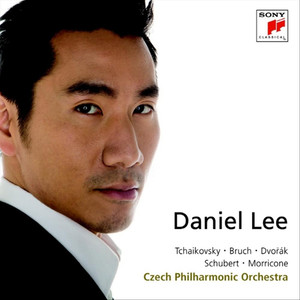
Daniel Lee and the Czech Philharmonic Orchestra
- 流派:Classical 古典
- 语种:英语
- 发行时间:2011-05-16
- 类型:录音室专辑
- 歌曲
- 时长
-
Variations On A Rococo Theme, Op. 33 - Variation 5
-
Variations On a Rococo Theme, Op. 33 - Moderato Quasi Andante, Theme
-
Variations On A Rococo Theme, Op. 33 - Variation 2
-
Variations On A Rococo Theme, Op. 33 - Variation 3
-
Variations On A Rococo Theme, Op. 33 - Variation 4
-
Variations On A Rococo Theme, Op. 33 - Variation 1
-
Variations On A Rococo Theme, Op. 33 - Variation 6
-
Variations On A Rococo Theme, Op. 33 - Variation 7 & Coda
-
Once Upon A Time In America
-
The Mission
简介
“The new album is about virtuosity and music from the heart. We recorded it in Prague, with the Czech Philharmonic in Dvorak Hall. It was my first time there, and to record some short pieces by Dvorak in his native homeland was an unforgettable experience. In the album, I play the Rococo variations by Tchaikovsky, short pieces by Dvorak, Bruch, Schubert and Morriconne, all pieces that come from the heart. So the album is about romance, beauty of life and a little spice from the Rococo period.” -Daniel Lee Daniel Lee, cellist Charles Olivieri-Munroe, conductor Czech Philharmonic Orchestra Daniel Lee is back. Well-known as Rostropovich's last protégé, Korean-American cellist Daniel Lee performed his recital in Korea in 2003 and immediately received acclaim. I've been feeling a great thirst for "hearing" him since long, and voilà, he returned with his long-awaited third album. In the album which was recorded in Prague Czech republic, he plays pieces by Tchaikovsky, Dvorak, Schubert and film music by Ennio Morricone. He surprised me from the first track, the only cello concerto of Tchaikovsky, the Variations on a Rococo Theme. Followed by the introduction of the orchestra, the tone of his cello reminded me of a great calligrapher making thick brush strokes without hesitation. His cello sounds bold and indifferent but he doesn't miss the detail. He invites us to Tchaikovsky in determined but free touching. Leading the orchestra with rich tone, his bowing is amazingly soft and elegant. . He plays in perfect harmony with the North Czech Philharmonic Orchestra, conducted by Charles Olivieri-Munroe who made recordings with famous artists including the cellist Sol Gabetta. Daniel Lee shows all the elegance in Tchaikovsky's Variations on a Rococo Theme, in which Tchaikovsky reflected the Rococo style, the decorative and ornate style of art developed during the late baroque period. It is in Variation VI: Andante that his expressive power for Tchaikovsky's characteristic sentimental nostalgia stands out. Daniel Lee proves himself that he is now more than just one of musical prodigies. From deep low-pitched tones to high-pitched tones/the harmonic, from the bold outline to the sharp detail, all I can say is that he is perfect. And at last, his thrilling play captivates all of us and leads us to the grand finale. Listening to his legato strings for Max Bruch's Kol Nidrei(all vows), I was momentarily under the illusion that I was attending a solemn ceremony of a monk praying alone to God. At the end of Max Bruch, his rendition is full of profundities and humanity. Daniel Lee is just 31 at present but his music is more mature, deeper and freer than anyone else. Antonin Dvorak's Klid (Silent Woods) is a piece about a traveler who follows the path through the woods. Lee starts bowing the cello as though a calligrapher draws thick strokes, and he spreads romanticism out over this piece. The next is Dvorak's "Songs My Mother Taught Me" within a set of songs called “the Gypsy Songs” expressing the beauty of the song handed down from generation to generation and thanks to his mother. His deep understanding about the song adds gypsy’s spirit to his performance. And the unique arrangement redounds to his musical virtuosity. Then he launches into a soulful rendition of Franz Schubert’s Ave Maria, the most famous one for all ages and countries and prays with tone on tenor. He concludes the album with two film songs composed by Italian soundtrack master Ennio Morricone. Listening to the first song, Deborah`s Theme in “Once Upon a Time in America”, I recalled vividly Robert De Niro and Jennifer Connelly in the film. Daniel Lee’s performance touched my heart in a perfect mélange of lyricism and romanticism. The last song is Gabriel's Oboe from “The Mission” of which the derived version with lyrics ‘Nella Fantasia’ has become well known to listeners nowadays. The theme was used when Jeremy Irons (the Jesuit Father Gabriel) walked up to a waterfall and started playing his oboe, aiming to befriend the natives, the Guaraní tribesmen. Puzzled by the sounds of the unknown instrument at first, but they approached Gabriel. Several artists have performed "Gabriel's Oboe" but I am sure that Daniel Lee’s rendition is among most beautiful. After hearing all the tracks, I was impressed and happy as though I finished a great novel. Daniel Lee returned with his long-awaited finest album, recorded with the North Czech Philharmonic Orchestra conducted by Charles Olivieri-Munroe. I was lucky to be the first one to meet this excellent album and to introduce this album to you. -Ilbum Chang / Music critic & DJ of ‘Home Music’, a program on KBS FM classic music channel Executive Producer: Sugeun Lee (Santa Music) Project Manager: Hwangyu Kim (Santa Music) Conductor: Charles Olivieri-Munroe Director: Sylva Smejkalova Recording: Oldrich Slezak Assistant: Cenda Kotzmann Coordinator: Peter Pycha Mastering: Byeong-Joon Hwang (Soundmirror Korea) Photography: Tuan Lee Project Coordinator: Adam Crane Artist Management: Santa Music Recored in Dvorak Hall, Rudolfinum, Prague, Czech Republic

